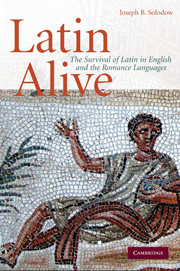Book contents
- Frontmatter
- Contents
- List of Maps
- Acknowledgments
- 1 Introduction
- PART ONE LATIN
- PART TWO THE ROMANCE VOCABULARY
- PART THREE PROTO-ROMANCE, OR WHAT THE LANGUAGES SHARE
- PART FOUR EARLIEST TEXTS AND FUTURE DIRECTIONS, OR WHERE THE LANGUAGES DIVERGE
- 14 French
- 15 Italian
- 16 Spanish
- Suggestions for Further Reading
- General Index
- Index of English Words
16 - Spanish
Published online by Cambridge University Press: 05 June 2012
- Frontmatter
- Contents
- List of Maps
- Acknowledgments
- 1 Introduction
- PART ONE LATIN
- PART TWO THE ROMANCE VOCABULARY
- PART THREE PROTO-ROMANCE, OR WHAT THE LANGUAGES SHARE
- PART FOUR EARLIEST TEXTS AND FUTURE DIRECTIONS, OR WHERE THE LANGUAGES DIVERGE
- 14 French
- 15 Italian
- 16 Spanish
- Suggestions for Further Reading
- General Index
- Index of English Words
Summary
POLITICAL HISTORY OF THE IBERIAN PENINSULA
Three centuries after the Visigoths, who had entered from France, the Arabs crossed the Strait of Gibraltar and invaded the Iberian peninsula. After a swift, decisive victory over the Christians at Jerez de la Frontera in 711, they needed only seven more years to overrun the peninsula. They did not, however, succeed in conquering the whole of it, for the northernmost regions remained beyond their grasp. That the north stayed free is not surprising because by invading from the south the Arabs pushed their surviving opponents into territory more mountainous and therefore more resistant. The next eight centuries in Iberia were dominated by the Reconquest, the gradual success of the Christian kings in retaking what had been lost to the Arabs. The linguistic–political history of the peninsula can be conveniently, if crudely, envisioned as the unrolling of three vertical stripes: three northern regions that each extended its political power and linguistic influence southwards. The western stripe represents the Galician and Portuguese languages; the eastern, Catalan; the broad central stripe, Castilian.
Galicia is the northwestern region of Spain. As the Reconquest, starting from the Kingdom of Asturias, advanced slowly southwards, the local version of Romance speech spread with it. After the capture of Toledo, in 1085, a signal event in the story, the King of Castile, Alfonso VI, gave two of his daughters in marriage to two Burgundian brothers, presenting each son-in-law with a broad strip of territory along the western edge of the peninsula, with the River Minho set as the border between them.
- Type
- Chapter
- Information
- Latin AliveThe Survival of Latin in English and the Romance Languages, pp. 310 - 332Publisher: Cambridge University PressPrint publication year: 2010



